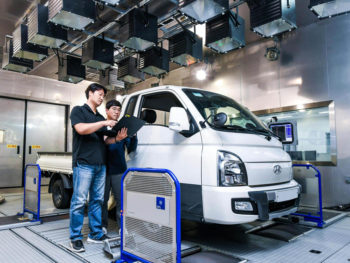Hyundai has revealed a system that estimates the gross vehicle weight of a light duty commercial electric vehicle and optimises performance accordingly.

The system uses acceleration sensors (accelerometers) to optimise the vehicle’s settings based on current gross weight estimate. This technology is being considered by Hyundai for use on future light duty electric commercial vehicles.
The immediate benefit in being able to calculate the gross weight of a vehicle on the move means that the electric vehicle’s torque output can be optimised to maximize estimated remaining range.
Consequently, the system reduces wheel spin and increases traction when a vehicle is carrying less payload, thus increasing commercial efficiency, Hyundai adds. The new technology also allows for changes in torque output based on topography, altering the amount of torque needed to propel a vehicle uphill based on its gross weight.
“Hyundai developed this technology because we realise that we need to take a different approach when it comes to developing electric vehicles for commercial use,” said Chae Mo Yang, group leader of Eco-Technology Performance Development Group. “We are preparing for a future where we will be able to offer commercial EVs that operate at its optimum specifications under any given road condition and regardless of how much payload it is carrying. These vehicles will be very economical to operate.”
Hyundai’s use of acceleration sensors means the system can be used on any electric vehicle, not just those equipped with air suspension and weight sensors, which can prove costly. In theory at least, this should mean the system’s cost is kept to a minimum.
Using acceleration to calculate weight via the laws of physics, the system is able to adjust motor torque output and consequently ensure vehicle range is maximised, as the lighter the vehicle is, the lower the amount of torque is required to move it. Hyundai says this should enhance efficiency for commercial use.
In other Hyundai commercial vehicle activity news, last year the company signed a MOU with the Swiss company H2 Energy to establish Hyundai Hydrogen Mobility, which aims to provide one thousand heavy duty fuel cell electric trucks for five years.

